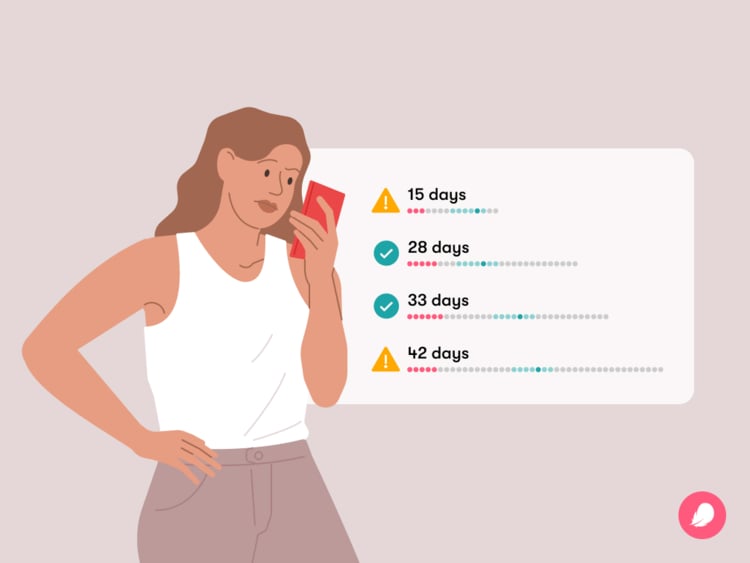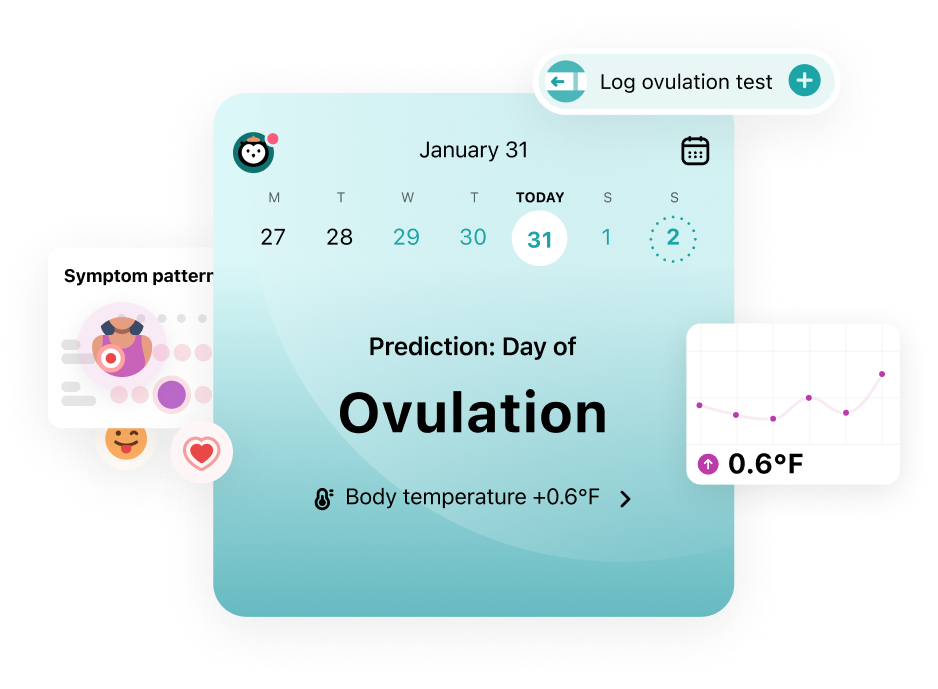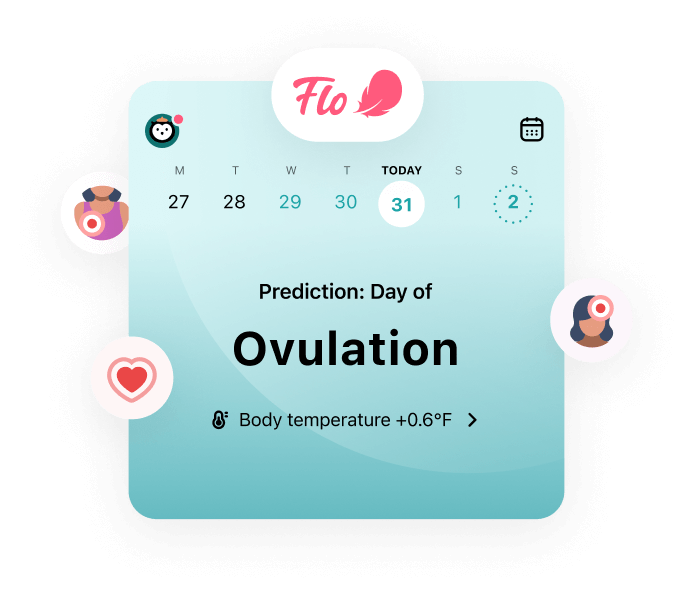Irregular periods don’t necessarily mean you’ll have any problems getting pregnant. Find out how to give yourself the best chance of conceiving when your cycles are unpredictable, with advice from a Flo expert.
-
Tracking cycle
-
Getting pregnant
-
Pregnancy
-
Help Center
-
Flo for Partners
-
Anonymous Mode
-
Flo app reviews
-
Flo Premium New
-
Secret Chats New
-
Symptom Checker New
-
Your cycle
-
Health 360°
-
Getting pregnant
-
Pregnancy
-
Being a mom
-
LGBTQ+
-
Quizzes
-
Ovulation calculator
-
hCG calculator
-
Pregnancy test calculator
-
Menstrual cycle calculator
-
Period calculator
-
Implantation calculator
-
Pregnancy weeks to months calculator
-
Pregnancy due date calculator
-
IVF and FET due date calculator
-
Due date calculator by ultrasound
-
Medical Affairs
-
Science & Research
-
Pass It On Project New
-
Privacy Portal
-
Press Center
-
Flo Accuracy
-
Careers
-
Contact Us
How to improve your chances of getting pregnant when your periods are irregular


Every piece of content at Flo Health adheres to the highest editorial standards for language, style, and medical accuracy. To learn what we do to deliver the best health and lifestyle insights to you, check out our content review principles.
Having irregular periods can be tough when you’re trying for a baby. Not only is it harder to predict your fertile window (the time during your cycle when you’re most likely to conceive), but you may be worried whether you’re ovulating at all.
It’s important to know that while irregular periods can make it harder to get pregnant, they don’t necessarily mean you’ll have any fertility problems, because you may still ovulate. There are also various things you can do to improve your chances of conceiving. From having more sex to making tweaks to your lifestyle, we’ll look at the doctor-approved tips on getting pregnant with unpredictable cycles.
Key takeaways
- Having irregular periods (e.g., periods that are fewer than 21 days or more than 35 days apart) can make it harder to get pregnant, as it makes it more difficult to figure out your fertile window.
- Irregular periods could signal a problem with ovulation, but they don’t automatically mean you’ll have an issue getting pregnant.
- If your periods are irregular, you should speak to your doctor to find out the cause, work on maintaining a healthy lifestyle, and try ovulation-tracking methods that don’t rely on a calendar (like monitoring basal body temperature and using ovulation kits).

 Over
7.8M
ratings averaging
4.8/5
*
Over
7.8M
ratings averaging
4.8/5
*
Understand your fertility better with the Flo app
- Learn more about your fertility signals
- Improve ovulation predictions by tracking temperature via Apple Watch
- Log your ovulation test results
 Over
7.8M
ratings averaging
4.8/5
*
Over
7.8M
ratings averaging
4.8/5
*

Trying to conceive?
The Flo app can help you better understand your fertility

 Over
7.8M
ratings averaging
4.8/5
*
Over
7.8M
ratings averaging
4.8/5
*
Understand your fertility better with the Flo app
- Learn more about your fertility signals
- Improve ovulation predictions by tracking temperature via Apple Watch
- Log your ovulation test results
Is it harder to get pregnant if your period is irregular?
“It can be harder to get pregnant with an irregular period,” says Flo expert Dr. Renita White, obstetrician and gynecologist, Georgia Obstetrics and Gynecology, Georgia, US. “If your cycle is not regular, this could be due to lack of regular ovulation.”
Taking it back to basics, ovulation is the release of an egg. Typically, it happens once per cycle, roughly halfway through. “If you do not ovulate each month [also known as anovulation], that means your egg is not available to be fertilized by sperm. This can make it harder and sometimes impossible to get pregnant,” adds Dr. White.
In fact, ovulation issues are the root cause of infertility in about a quarter of couples struggling to conceive. But don’t let this panic you. If you’ve been struggling to get pregnant for a while, and irregular ovulation is to blame, it’s possible to stimulate your ovaries to start releasing eggs with certain fertility drugs.
Your doctor will likely refer you to a fertility specialist once you’ve been trying for a year without success or for six months if you’re over 35. If that’s you, then schedule an appointment with them. If you haven’t gotten to this point yet, there are other things you can do to boost your chances of getting pregnant.
Take a quiz
Find out what you can do with our Health Assistant
How to improve your chances of getting pregnant
Speak to your doctor
“You should talk to a doctor even before trying to conceive if you have irregular periods,” says Dr. White. “It is important to figure out why your cycle is irregular.”
Tracking your cycles and symptoms using an app like Flo can help you spot patterns and may also help your doctor to figure out what’s going on.
Your health care provider will be able to help you identify any lifestyle factors that could be wreaking havoc on your periods, like stress, excessive exercise, or being under- or overweight. They may also want to test you for certain medical conditions that can cause irregular periods, including the following:
- Polycystic ovary syndrome (PCOS)
PCOS is when cysts (small sacs of fluid) develop inside your ovaries. It’s the most common condition to cause irregular periods. And although PCOS can make it harder to get pregnant, it’s also one of the most treatable causes of infertility in women and people who have periods. If you think you may have PCOS, then schedule an appointment with your health care provider.

- Underactive or overactive thyroid
When your thyroid glands aren’t working properly, it can cause a hormonal imbalance and make your periods irregular. But these conditions can also be treated, restoring your fertility. A simple blood test will help your doctor figure out if there’s something going on with your thyroid, so schedule a checkup if you’re at all concerned.
- Hyperprolactinemia
Prolactin is the hormone responsible for breastfeeding and breast tissue development. When levels are too high, it can interfere with the hormones that control your menstrual cycle and lead to irregular periods. The good news is that people with this condition can usually become pregnant once they’ve been treated with the right medication. Reach out to your doctor for more information.
Find your fertile window
When you’re trying for a baby, your fertile window is important. As the name suggests, it’s the phase in your cycle when you’re likely to be fertile — so the time to have lots of sex. Your fertile window includes the five days before ovulation and one day after, which means knowing when you ovulate is key.
However, frustratingly, some of the most common ways to track ovulation — like the calendar method — can be less accurate if your periods aren’t regular. Thankfully, there are other ways to figure out when you’re ovulating if you have irregular periods, including the following:
- Ovulation tests
Just before you ovulate, your body produces a surge of luteinizing hormone (LH), which signals your ovary to release an egg. So, ovulation tests work by measuring the levels of LH in your urine (taking one is a bit like taking a pregnancy test). “Using ovulation prediction kits may be useful to help identify the LH surge that occurs before ovulation,” says Dr. White. “This can help better identify your fertile window if you have irregular cycles.”
For regular 28-day cycles, where ovulation tends to happen around day 14, the advice is to start testing from day 10. But when your fertile window is unpredictable, you can try testing throughout your cycle from the day after your period ends to make sure you catch the surge. Of course, having to take multiple tests can be expensive and a hassle. But as they are 99% accurate, the kits can be a reliable way to figure out if and when you’re ovulating.
Take this Flo member’s experience for example. “Buy a box of 50 ovulation strips and use one every day until you find out when your ovulation starts,” they wrote in Secret Chats. “From the next cycle on, just use them the week around the time you ovulated last month. That’s how I found out I ovulate on cycle day 18–21, not 14.”
- Basal body temperature (BBT) tracking
Your BBT is your temperature when your body is completely at rest, and it rises very slightly during ovulation. This means that tracking your BBT every day over several months can help you figure out your fertile window. The downside is that the readings tell you that you have already ovulated, rather than that you’re about to. So when you see the rise, it may already be too late to conceive that cycle. On the plus side, when your periods are irregular, this method can help you spot if you’ve been ovulating or not, which can otherwise be hard to tell.
- Cervical mucus changes
One of the key symptoms of ovulation is changes to cervical mucus (otherwise known as vaginal discharge), which becomes clear and slippery, a bit like raw egg whites, around the time you release an egg. If you notice this change, that means it’s a great time to have sex. You can use an ovulation-tracking app like Flo to log any changes you notice to your discharge, helping you to spot any patterns in your cycle.
You can also try using cervical mucus tracking along with another method, like this person using Flo. “My cycles last from 33 days to 55 days,” they explained in Secret Chats. “When I noticed an increase in discharge halfway through my cycle (very wet and milky), I would use ovulation strips to catch my peak. Got pregnant on my second try.”
Have more sex
“Since someone with irregular periods doesn’t know exactly when they will be in their fertile window, having more sex allows for more opportunities for sperm to be present if you do ovulate,” says Dr. White.
So how much sex are we talking about? Well, it can help to have sex every two to three days throughout your cycle if you can. But don’t beat yourself up if this schedule isn’t practical (or particularly enjoyable) for you and your partner. After all, you are people, not machines! It can help to know that sperm can live for up to five days inside you. So in theory, having sex every five days could give you a chance to catch ovulation.
Reduce stress
When you get stressed, your body produces a hormone called cortisol, which can work against the period-inducing hormones estrogen and progesterone. This can impact your period, making it late or disappear completely.
However, the effects of stress on your periods are usually temporary. “Sometimes significant stress may lead to a late or irregular [periods] for one to two months,” says Dr. White. “It should not lead to you always having irregular periods.”
It’s also hard to say how much stress it would take to stop your periods, as everyone tolerates stress differently. But you can try to become aware of what your stress triggers are and make an effort to limit them. “Reducing physical or emotional stress may help to prevent a delayed cycle,” says Dr. White.
Paying attention to your daily habits can make a big difference. For example, getting quality sleep, exercising regularly, and practicing meditation are all science-backed ways of reducing stress.
Take care of yourself
Because it pumps your body with endorphins — your body’s feel-good chemicals — exercise is a great stress buster. However, it’s possible to have too much of a good thing. Overexercising is one of the possible causes of irregular periods (in fact, it’s a common condition among athletes). So if you haven’t worked out in a while and then suddenly start training hard, it can disrupt your cycle.
Likewise, suddenly losing a significant amount of weight can pause your period. This is because when your body goes through extreme physical changes — whether through intense exercise or weight loss — it will try to conserve energy by stopping your menstrual cycle.
On the flipside, being overweight or obese can also make you lose your period. Having a high body mass index (BMI) can mess with your hormones, and this can disrupt the menstrual cycle.
All this means that taking care of yourself by exercising moderately and eating a balanced, nutritious diet could help to regulate your periods and increase your chances of getting pregnant.
“Incorporating healthy eating habits, such as eating green leafy vegetables and avoiding processed foods, has been linked with less insulin resistance and weight gain that complicate PCOS and other conditions that cause irregular periods,” adds Dr. White. “Healthy habits also include avoiding toxins, such as tobacco and drugs, which may negatively impact other aspects of fertility.”
Reducing stress and starting healthy habits worked for this person using Flo. “My periods were always irregular due to stress and constant weight loss,” they explain on Secret Chats.
“As soon as I changed my job, finished school and started working out and eating more home cooked food (and not snacking) my periods became more and more regular! I was always terrified I would have problems getting pregnant, but I got pregnant two months after we got married, the first month of trying.”
A final note on trying to conceive
Remember, having irregular periods doesn’t necessarily mean you’ll have any issues getting pregnant. “You should not be worried,” says Dr. White. “But you should be informed. Working with a doctor can help you identify the cause of the irregular periods and get pregnant faster if you need assistance trying to conceive.”
If your unpredictable cycles are getting you down, know that you’re not alone — up to a quarter of women have irregular periods. Joining Secret Chats on the Flo app is one way to (anonymously) meet others who might be going through a similar thing and can be a great source of support. Trying to get pregnant can be stressful at the best of times, even with the most regular of cycles. Reaching out to other parents-to-be — whether through Secret Chats or otherwise — can remind you that we’re all in it together.
More FAQs
How do you know if you have irregular periods?
Irregular periods are fewer than 21 days or more than 35 days apart.
While the length of time between cycles can vary, if there is a difference of seven to nine days between your longest and shortest cycle, this is also considered irregular.
Doctors consider a normal menstrual cycle to be one that ranges from 21 days to 35 days, with the average length being 28 days.
Do irregular periods mean infertility?
No, having unpredictable periods doesn’t necessarily cause infertility. It can make it harder to know when you’re most fertile, but it doesn’t always mean you’ll struggle to get pregnant.
How do you know you’re ovulating with irregular periods?
Testing for a hormone called progesterone — which increases after ovulation — can confirm that you are ovulating with irregular periods. Your doctor can look for the rise via a blood test. Alternatively, there are now devices available that allow you to measure your progesterone levels at home.


Hey, I'm Anique
I started using Flo app to track my period and ovulation because we wanted to have a baby.


The Flo app helped me learn about my body and spot ovulation signs during our conception journey.


I vividly
remember the day
that we switched
Flo into
Pregnancy Mode — it was
such a special
moment.
Real stories, real results
Learn how the Flo app became an amazing cheerleader for us on our conception journey.
References
“Abnormal Uterine Bleeding.” The American College of Obstetricians and Gynecologists, Dec. 2021, www.acog.org/womens-health/faqs/abnormal-uterine-bleeding.
“Anovulation.” Cleveland Clinic, my.clevelandclinic.org/health/diseases/21698-anovulation. Accessed 31 May 2024.
“Basal Body Temperature for Natural Family Planning.” Mayo Clinic, 10 Feb. 2023, www.mayoclinic.org/tests-procedures/basal-body-temperature/about/pac-20393026.
“Can Stress Cause You to Skip a Period?” Cleveland Clinic, Sep. 2020, health.clevelandclinic.org/can-stress-cause-you-to-skip-a-period.
“Exercise and Stress: Get Moving to Manage Stress.” Mayo Clinic, 3 Aug. 2022, www.mayoclinic.org/healthy-lifestyle/stress-management/in-depth/exercise-and-stress/art-20044469.
“Evaluating Infertility.” The American College of Obstetricians and Gynecologists, Jan. 2020, www.acog.org/womens-health/faqs/evaluating-infertility.
“Female Infertility.” Mayo Clinic, 27 Aug. 2021, www.mayoclinic.org/diseases-conditions/female-infertility/diagnosis-treatment/drc-20354313.
Godman, Heidi. “Top Ways to Reduce Daily Stress.” Harvard Health Publishing, 1 Mar. 2022, www.health.harvard.edu/staying-healthy/top-ways-to-reduce-daily-stress.
“How Long Do Sperm Live after Ejaculation?” Mayo Clinic, 5 May 2022, https://www.mayoclinic.org/healthy-lifestyle/getting-pregnant/expert-answers/pregnancy/faq-20058504.
“Hypothyroidism and Infertility: Any Connection?” Mayo Clinic, 20 May 2023, www.mayoclinic.org/diseases-conditions/female-infertility/expert-answers/hypothyroidism-and-infertility/faq-20058311.
“Irregular Periods.” Cleveland Clinic, my.clevelandclinic.org/health/diseases/14633-abnormal-menstruation-periods. Accessed 31 May 2024.
“Irregular Periods.” Health Service Executive, www2.hse.ie/conditions/irregular-periods/. Accessed 31 May 2024.
“Irregular Periods.” NHS, www.nhs.uk/conditions/irregular-periods/. Accessed 31 May 2024.
Mena, Gabriela P., et al. “Prospective Associations between Physical Activity and BMI with Irregular Periods and Heavy Menstrual Bleeding in a Large Cohort of Australian Women.” Human Reproduction, vol. 36, no. 6, May 2021, pp. 1481–91, https://doi.org/10.1093/humrep/deab055.
Ogle, Alicia. “Using Ovulation Tools to Predict Fertility.” Mayo Clinic Health System, 13 June 2023, www.mayoclinichealthsystem.org/hometown-health/speaking-of-health/using-ovulation-kits-to-predict-fertility.
“Ovulation.” Cleveland Clinic, my.clevelandclinic.org/health/articles/23439-ovulation. Accessed 31 May 2024.
“Physical Activity and Your Menstrual Cycle.” Office on Women’s Health, 16 Feb. 2021, www.womenshealth.gov/getting-active/physical-activity-menstrual-cycle.
“Polycystic Ovary Syndrome (PCOS).” Mayo Clinic, 8 Sep. 2022, www.mayoclinic.org/diseases-conditions/pcos/symptoms-causes/syc-20353439.
“Prolactin.” Cleveland Clinic, my.clevelandclinic.org/health/articles/22429-prolactin. Accessed 31 May 2024.
“Rhythm Method for Natural Family Planning.” Mayo Clinic, 7 Mar. 2023, www.mayoclinic.org/tests-procedures/rhythm-method/about/pac-20390918.
Su, Hsiu-Wei, et al. “Detection of Ovulation, a Review of Currently Available Methods.” Bioengineering and Translational Medicine, vol. 2, no. 3, Sep. 2017, pp. 238–46, https://doi.org/10.1002%2Fbtm2.10058.
“The Menstrual Cycle: Menstruation, Ovulation, and How Pregnancy Occurs.” The American College of Obstetricians and Gynecologists, Jan. 2022, www.acog.org/womens-health/infographics/the-menstrual-cycle.
Torborg, Liza. “Mayo Clinic Q and A: Effect of PCOS on Fertility Can Vary from One Woman to Another.” Mayo Clinic, 14 July 2015, newsnetwork.mayoclinic.org/discussion/mayo-clinic-q-and-a-effect-of-pcos-on-fertility-can-vary-from-one-woman-to-another/.
Walker, Matthew H., and Kyle J. Tobler. “Female Infertility.” StatPearls, StatPearls Publishing, 19 Dec. 2022, www.ncbi.nlm.nih.gov/books/NBK556033/.
Wegrzynowicz, Andrea K., et al. “Complete Cycle Mapping Using a Quantitative At-Home Hormone Monitoring System in Prediction of Fertile Days, Confirmation of Ovulation, and Screening for Ovulation Issues Preventing Conception.” Medicina, vol. 58, no. 12, Dec. 2022, https://doi.org/10.3390/medicina58121853.
Welt, Corrine K. “Patient Education: Absent or Irregular Periods (Beyond the Basics).” UpToDate, 25 Mar. 2024, www.uptodate.com/contents/absent-or-irregular-periods-beyond-the-basics.
“What Are Menstrual Irregularities?” Eunice Kennedy Shriver National Institute of Child Health and Human Development, www.nichd.nih.gov/health/topics/menstruation/conditioninfo/irregularities. Accessed 31 May 2024.
Witt, Barry, “Trying to Get Pregnant? Here’s When to Have Sex.” The American College of Obstetricians and Gynecologists, Aug. 2023, www.acog.org/womens-health/experts-and-stories/the-latest/trying-to-get-pregnant-heres-when-to-have-sex.
Yahya, Fadi. “Why Are My Periods So Irregular, Heavy and Painful?” Mayo Clinic Health System, 22 Aug. 2023, www.mayoclinichealthsystem.org/hometown-health/speaking-of-health/why-are-my-periods-so-irregular-heavy-and-painful.
“Yes, Weight Loss Can Impact Your Menstrual Cycle.” Cleveland Clinic, Apr. 2023, health.clevelandclinic.org/can-weight-loss-affect-your-period.
History of updates
Current version (04 June 2024)
Published (07 December 2018)
In this article

Get your personal guide to fertility
-
Learn how to read your body's ovulation signals
-
Find daily conception tips from our experts
-
Chat with others who are trying to get pregnant




